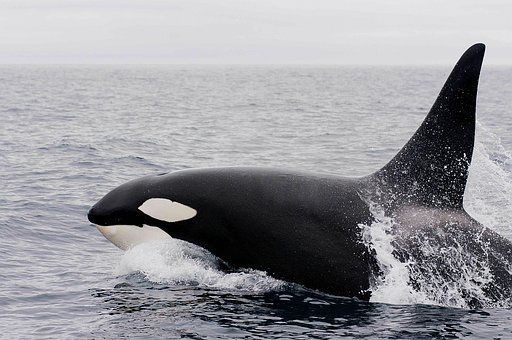Killer Whales Share Personality Traits with Chimpanzees and Humans!
Killer whales share personality traits with Chimpanzees.
ORCA Sci-Comm Team | November 19th, 2018.
According to new research, killer whales share similar personality traits to chimpanzees and humans, including playfulness, cheerfulness, and affection.
We’ve heard it before–chimpanzees are mammals that share about 98% of with humans but did you know we also shared personality traits? A recent study published in the Journal of Comparative Psychology found that killer whales are in that mix too, however, orcas have more traits in common with chimpanzees than humans.
The study used a common personality measure called the five-factor model, which assesses five personality dimensions, including extraversion, agreeableness, conscientiousness, dominance, and carefulness. The model, which was developed in the 1930s, describes personality traits using a combination of single adjectives or descriptive phrases.
Researchers found that the personality traits of killer whales were similar to those of both humans and chimpanzees but more similar to chimpanzees. Killer whales were similar to chimpanzees and humans in the extraversion factor (e.g., playful, gregarious, and sociable). Killer whales and chimpanzees also shared a combination of personality traits for conscientiousness (e.g., constant, stubborn, and protective) and agreeableness (e.g., patient, peaceable, and not bullying), along with some personality traits relating to dominance.
Lead researcher Yulán Úbeda, a doctoral student in psychology at the University of Girona in Spain said: “This is the first study to examine the personality traits of killer whales and how they relate to us and other primates”. The findings propose some evolutionary convergence where primates and whales are clustered similarly due to their ability to communicate in complex situations using their advanced cognitive abilities.
Other behaviors observed in killer whales that are similar to humans, including mourning the loss of loved ones. For instance, killer whales are known to live to old age (up to 90 years), in close-knitted pods that hunt, eat and live together. This cohabitation and interdependence require extensive communication and group cooperation. In 2017, an article in National Geographic reported an “unprecedented show of mourning that drew international attention”, where an orca named J35had dropped her dead calf after pushing it with members of her pod for 17 days and at least 1000 miles to the coast of Vancouver Island. These actions that require advanced communication, cognition and collaborative skills between animals have prompted the minds of scientists into studying their personality traits.
Even though researchers debate whether the behaviors observed were a sign of grief or something unknown, the act of keeping dead newborns afloat has been previously seen in other delphinid species. As killer whales are the largest member of the dolphin family, this occurrence is deemed unique but not unprecedented, although more studies on grief in animals need to be done before determining how animals in tight-knit groups mourn the loss of their loved ones or group members.
© Ocean Research & Conservation Association of Ireland (ORCA Ireland) and
www.orcireland.org, est. 2017. Unauthorized use and/or duplication of this material without express and written permission from this site’s author and/or owner is strictly prohibited. Excerpts and links may be used, provided that full and clear credit is given to Ocean Research & Conservation Ireland and
www.orcireland.org
with appropriate and specific direction to the original content.
References:
"Personality in Captive Killer Whales (Orcinus orca): A Rating Approach Based on the Five-Factor Model,"
Journal of Comparative Psychology, published online Nov. 15, 2018.
SHARE THIS ARTICLE














